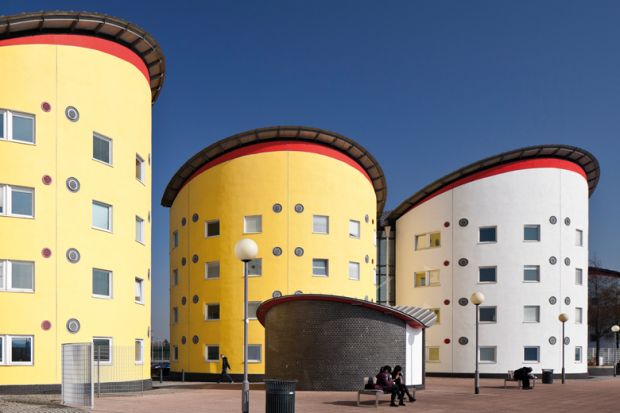The University of East London plans to take on more than £100 million of bond borrowing via a securitisation deal on its student residences, two years after it returned a deficit of £11 million.
UEL’s vice-chancellor, Amanda Broderick, said the university was borrowing not to construct new buildings but rather to invest in the student experience and “take market share”.
Concerns have been expressed about the increasing debt levels of UK universities, with a wave of university bonds issued since 2012 as competition to attract students intensifies.
UEL was among a number of institutions, many of them post-92s in London, to suffer in the unrestricted market in recruitment after the government lifted and then abolished student numbers controls. The institution saw its numbers of student acceptances fall from 5,510 in 2011 to 3,250 in 2017 – a 41 per cent decline – before rising to 3,945 in 2018.
The university returned deficits of £6.8 million in 2015-16, £10.9 million in 2016-17 and £600,000 in 2017-18. But it has focused on paying off its debts over that time and now describes itself as “debt free”.
The £103 million planned borrowing would be subject to approval by the English sector regulator, the Office for Students.
The university describes the borrowing as being via a securitisation deal on its student residences. Securitisation is a way of turning future income from an asset into an upfront cash lump sum.
A number of UK universities have issued bonds in recent years, but the only publicly announced previous example of a university doing so via securitisation of student residences was Keele University’s £75 million deal in 2000.
Professor Broderick, who took over at UEL in September 2018 after having served as chief executive of Newcastle University’s London campus, discussed the borrowing at a London Higher event on the capital’s sector.
The university has “secured one of the sector’s most competitive bonds, for £103 million”, Professor Broderick said. “And we’re not doing that to build capacity; we’re not doing that to put up some nice shiny buildings.
“We’re doing that in order to create a much more competitive business model. We’re doing that to invest in our student experience; we’re doing that to be able to support and partner with employers and with the enterprise community.
“So what we’re doing is a proposition to enable us to take market share but also to enable us to scope out new markets, not only through our organic growth but also through horizontal and vertical diversification as well.”
In a statement to Times Higher Education, Professor Broderick said that UEL’s debt-free status “gives us the flexibility to better use our assets”.
“The university is investigating a number of strategic investment opportunities, including the option of a £103 million securitisation on our student residences, to help us deliver our strategic vision. Our normal business operations are already fully funded, and the investment options are subject to contract and approval by the Office of Students,” the statement said.
UEL did not disclose the terms on the borrowing, such as the interest rate it will face.




